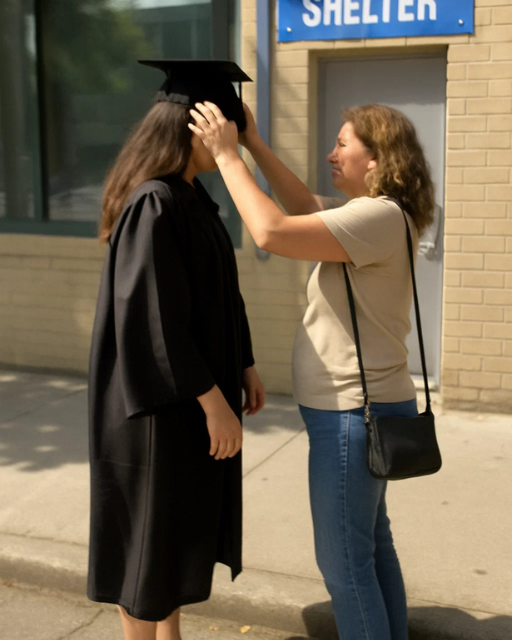We didn’t have a front yard. Or a driveway. Or a kitchen table to lay her acceptance letter on.
But we had that shelter.
Room 6, bunk on the left. That’s where she did her homework, read by flashlight after lights-out, and taped her college essays to the underside of the top bunk so she could revise them in the dark.
She never complained. Never once asked “why me.” She just kept going. Quietly. Determined. People always said she was too soft-spoken, but they didn’t hear the way she whispered math formulas to herself like prayers or how she used to recite vocabulary words to the younger kids during breakfast cleanup.
She used the back of donation forms for scratch paper. She edited essays between volunteer shifts and shelter curfews. Her first laptop was missing three keys, but she made it work.
And when the envelope came—the envelope—we cried together in the stairwell. The three of us huddled between boxes of donated coats and the smell of Tuesday night chili, shaking as we unfolded the letter.
Full ride.
Four years. Tuition. Books. Room. Meals.
It might as well have said “You belong here.”
She didn’t leave with bitterness in her heart. That surprised me. I expected some resentment—some need to get as far from this place as she could.
But she never forgot where she started. Never forgot Room 6.
When she came back four years later, it wasn’t in a flashy car. No photoshoots, no big crowd. Just her, her cap and gown in a small garment bag, and a soft smile that said more than any speech ever could.
She asked me to fix her cap.
Right there on the sidewalk.
I was still wearing my volunteer apron from lunch service. She handed me two bobby pins and said, “I couldn’t do it without you.”
My hands were shaking so badly I nearly dropped the tassel. I straightened it as best I could, barely able to see through the tears.
She adjusted the shoulders of her gown, looked around the parking lot like it was the front steps of a palace.
Then she said:
“I walked across their stage… but this is where I really graduated.”
We stood there in silence.
The shelter’s front door was propped open with a mop bucket. You could still hear the chatter of toddlers in the common room and someone coughing in the hallway. The hum of the vending machine buzzed faintly behind us.
But she didn’t seem to hear any of that.
She was too focused on something bigger.
She knelt down and hugged one of the kids coming out of Room 6—the same bunk she used to call her own.
“You’re next,” she whispered.
I’ve seen a lot of faces pass through those doors.
Some bitter. Some broken. Some numb.
But hers… hers was different.
She had every reason to give up. Every excuse ready-made.
But she didn’t.
She turned shelter hours into study hours. Turned whispered dreams into declared majors. Turned the quiet of survival into the strength of arrival.
And when they called her name at that big university, I bet nobody there knew where she started. That her first “desk” was a folded blanket and her “study lamp” was a flashlight under donated sheets.
But we knew.
We always will.
There are two kinds of graduations.
The one they photograph… and the one life makes you fight for.
She earned both.
If this story moved you, share it.
Not for applause, not for pity—but for every kid doing algebra on a soup kitchen napkin.
For every student who learns to write their name before they have a mailing address.
For every dream that starts in a doorway.
Because sometimes the hardest walk…
isn’t across the stage.
It’s the one that leads there. 🎓💛




